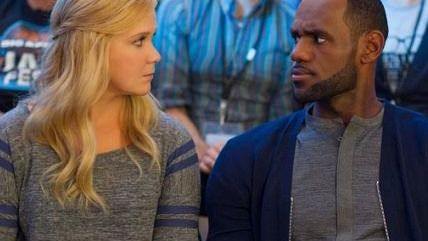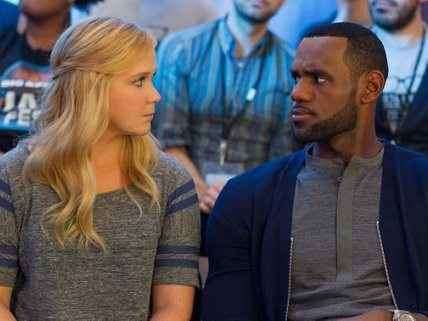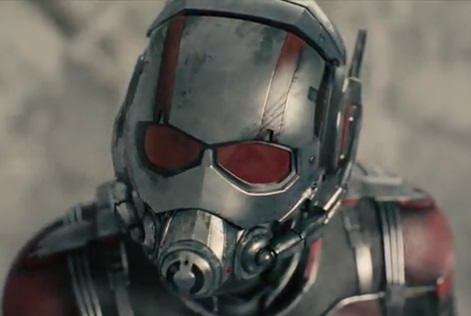Movie Reviews: Trainwreck and Ant-Man
Amy Schumer kills it in her big-screen debut. Paul Rudd stands small in an uneven Marvel super-movie.


In Trainwreck, TV phenom Amy Schumer gets her Hollywood closeup, and she's ready for it. The movie is a romantic comedy in the early Judd Apatow mode, by turns raunchy and sweet. But director Apatow seems refreshed by a relocation from his customary Los Angeles turf to the livelier precincts of New York. And following Schumer's wicked script, he's able to focus on a woman this time—a boozy, compulsively promiscuous mess who uses men as one-night sexual accessories, uninterested in the possibilities of true love and commitment. This being a rom-com, she eventually succumbs to cuddly affection in the arms of a good man. But along the way, Schumer delivers an avalanche of spectacularly sick lines and situations, sometimes drawing laughs with little more than a look or a tic or an eloquent grunt. By comedy standards, it's a titanic performance.
Schumer's character, also named Amy, is a staffer at a bottom-feeding magazine called S'nuff (sample feature idea: "Ugliest Celebrity Kids under Six"). When her editor (Tilda Swinton, virtually unrecognizable in career-shark drag) assigns her to write a profile of a famed sports doctor named Aaron (Bill Hader), Amy, who hates sports, reluctantly complies. Against all odds, Aaron, a textbook Nice Guy, is drawn to the out-of-control Amy (the question of why is never effectively addressed). Amy, for her part, is confused by her reciprocal attraction: Aaron is unlike any of the interchangeable bonk-mates who populate her nights (chief among them wrestler John Cena, going for it). And while her main concern is usually where she'll wake up in the morning ("Please don't be a dorm room"), she's now overwhelmed by the prospect of a real relationship, and all that it entails.
Just about every gag in the movie is too good to spoil. Apatow stages the many set-piece scenes with stylish economy (especially a startling Woody Allen homage in the shadow of the 59th Street Bridge). And it's hard to imagine how the supporting cast could be improved. With their minimalist underplaying, Hader and Brie Larson (as Amy's sister) are ideal foils for the more-animated Schumer. NBA star LeBron James is a deadpan wonder playing a sweetheart version of himself. Colin Quinn gives one of his best performances as Amy's scabrous dad. And Randall Park, Jon Glaser, and (especially) SNL regular Vanessa Bayer all have brief, shining moments as her off-kilter office colleagues.
Not everything works. A movie-within-the-movie thread featuring Daniel Radcliffe and Marisa Tomei feels out of place. And a long funeral scene is way too tearfully sincere. But when Schumer is on—and she's almost always on—the movie ascends into comedy heaven.

Ant-Man
Ant-Man isn't the Marvel misfire that fans of the titular tiny guy might have expected. But it does seem to reflect the movie's jumbled production history. As must be well-known even to infants by now, original director Edgar Wright and cowriter Joe Cornish departed the project just before shooting began. Then Adam McKay and star Paul Rudd stepped in to rewrite the script (which was further doctored by other, uncredited hands), and rom-com specialist Peyton Reed (Yes Man, The Break-Up) was brought aboard to direct. Marvel itself, of course, kept a very close eye on all of this.
The result is unusually amiable for an Avengers-linked movie. But the picture feels lumpy, especially in its first hour, much of which is a nap-inducing slog through origin-story exposition. The Marvel formula is in predictable effect—troubled protagonist, world-threatening bad guy—and intermittent attempts to sync the picture with the larger Marvel universe (references to S.H.I.E.L.D. and Hydra, and more) suggest an overriding corporate determination.
Rudd plays Scott Lang—the miniscule Ant-Man—with his usual low-key charm. But Lang is too low-key a character to really rouse us. And he's a little hazy—a guy with a degree in electrical engineering who for some unexplained reason decided to become a cat burglar? As the movie begins, Scott is being released from prison and welcomed back by his old partner in crime, Luis (a hilarious Michael Peña). Luis and the rest of Scott's former gang mates (David Dastmalchian and rapper T.I.) have a new heist planned. But Scott, in sentimental Marvel fashion, wants to go straight for the sake of his daughter Cassie (Abby Ryder Fortson), who lives with his ex-wife, Maggie (Judy Greer), and her boyfriend, a cop named Paxton (Bobby Cannavale). The slog begins.
Scott manages to get a job (in product placement, at a Baskin-Robbins outlet), but loses it when his criminal record is discovered. Returning to Luis and the boys, he signs on for their planned caper, which involves cracking a safe in the mansion of Dr. Hank Pym (Michael Douglas). The safe turns out to contain only an odd leather uniform, but donning it plunges Scott down into the mini-world of Ant-Man. There, he launches into the movie's first stretch of digital brilliance, fleeing for his life from a gushing faucet and a huge, looming vacuum cleaner, among other terrors. The meticulous design of this sequence stirs something like a sense of wonder—by now the rarest of responses to contemporary CGI.
Soon we learn that Pym created the Ant-Man suit, and was the first to wear it. Its secret is the Pym Particle, which the doctor has always kept secret. But now his onetime protégé, the demented Darren Cross (Corey Stoll), is attempting to replicate the particle in order to create a deadly wasp-man called Yellowjacket, which he intends to sell for military purposes. Pym is determined to stop Cross, and of course he wants Scott to strap on the Ant suit and help.
Here Marvel demonstrates a manipulative self-awareness. Pym's daughter Hope (Evangeline Lilly), is a martial-arts master, and clearly much better qualified than Scott for Ant-Person duty. The movie plays this obvious fact as an in-joke, but it nevertheless stirs distracting thoughts. One needn't be a droning feminist to wonder what ever happened to DC's long-bruited Wonder Woman movie, or the Black Widow spinoff Marvel really ought to make. Maybe later, Marvel suggests here. For the moment, though, please be content to watch Hope's initial hostility toward Scott—for taking a gig that should be hers—melt into the usual puddle of romantic surrender.
The movie proceeds unsurprisingly toward a tumultuous assault on Cross' big science lair, with Scott soaring around on airborne carpenter ants, navigating a waterway on a raft of fire ants, and battling a bad guy atop a speeding toy train. There's a lot of top-flight digital expertise on display, but it's subverted by the story's uneven construction (and its over-extended length). No matter how big the effects, the picture still feels small and trifling; and the sequel inevitably signaled at the end prompts little in the way of anticipatory excitement.


Show Comments (17)